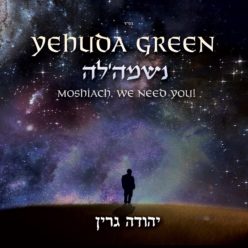The Story Behind the Song
Memories and messages merge into soul sounds with Yehuda Green’s latest release
T
he merging of Rochel Imeinu’s tears and HaKadosh Baruch Hu’s promise to her has been an endless source of strength through the millennia of galus, and that inspiration wasn’t lost on Yehuda Green, as the concept for his Neshamele album was coming together. As the playlist crystallized, Yehuda Green experienced a throwback to his childhood in Jerusalem, growing up in Meah Shearim. His nephew reminded him of how they used to sing “Kol Beramah” together so many years back.
“The memory was so clear,” Yehuda says. “Here I stood, playing on my little keyboard at the window of our apartment, singing ‘Kol Beramah,’ and opposite us was Rav Elyashiv, learning near his own window. I always felt a special pull to that song, maybe because of our family connection. Every Thursday night, my zeide went out to daven at Kever Rochel and then at Kever Shimon Hatzaddik, Kever Dovid Hamelech, and the Kosel. In fact, when my father was a bochur, he was one of the people who had the key to Kever Rochel. Although the visits were risky at times, our family never stopped going to Mamme Rochel. So bringing this song — ‘Kol Beramah’ — to the public closes a circle for me.”
Other memories of years gone by also played a part in the album. When Yehuda saw his deceased mother in a dream one night, he awoke, shaken, and couldn’t get the words she spoke out of his head: “My mother a”h was standing by the window of our home in Yerushalayim, and my little brother Chaim was coming home. I heard her sing out, ‘Chaim’ke, kumt aheim,’ and those words, in the tune she used, remained embedded in my mind.” Yehuda changed “Chaim’ke” to “neshamele” and knew he had the kernel of a great song.
But the rest of the lyrics for that title track of his new album Neshamele came into Yehuda’s hands when Avrumi Weinberger told the singer that he had come across some writings of Rebbe Ahrele Roth, the founding rebbe of the Toldos Aharon dynasty, which carried a profound message: “Holy neshamah, remember who you are and where you come from. Are you not a daughter of the Great and Awesome King?” Yehuda attached this idea to the haunting “Kumt aheim” theme, which he expanded further to touch on the teaching that angels accompany and watch over each child. The song is dedicated both to his mother and to a sick little boy who needs that protection desperately.
Bobover chassidim will feel right at home with Track 8, titled “Shtetel Niggun.” Five years ago, Yehuda Green was performing at a simchah in Brooklyn, where he ran into Reb Abish Brodt. He took the opportunity to ask Reb Abish about this particular niggun, which he remembered singing for Lecha Dodi as a child in shul in Meah Shearim. Reb Abish replied that the tune came from Yossele Mandelbaum, a pre-war Bobover chassid. “Twenty minutes later, he came running over to me: ‘Guess what, the Bobover Rebbe is coming in! Welcome the Rebbe with this song!’ It was beautiful — the Rebbe danced to this niggun for at least six minutes.” The song has several parts and a nostalgic, uplifting feel.
The last track to be added to the CD was “Mashiach,” a lively, heartwarming song that somehow feels both old and new, and bursts with buoyant hope. It was actually composed spontaneously, in mid-performance, while Yehuda was doing a show in New York “for bochurim who needed to be lifted up.” One of the organizers came over and asked him to call up a certain bochur by name.
“This was a kid who needed a lot of love,” Yehuda remembers, “so I started to sing, ‘Sruli, Sruli, where are you? We are all waiting for you.’ I composed the tune on the spot, and that ‘Sruli, where are you?’ later became ‘Mashiach, Mashiach, where are you? We are all waiting for you….’ At the last minute, in the studio, Mendy Worch added another stich to the lyrics: ‘Mashiach ben David we need you, Yavo veyigaleinu.’ ”
Varied as the songs are — fast, slow, old, new — the voice on it all is infused with Green’s hallmark wistful warmth, calling out to the neshamele in all of us.
(Originally featured in Mishpacha, Issue 717)



